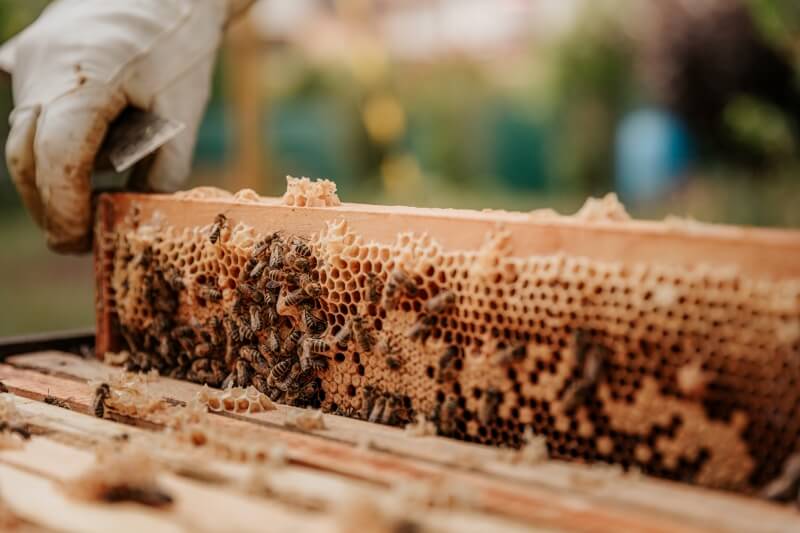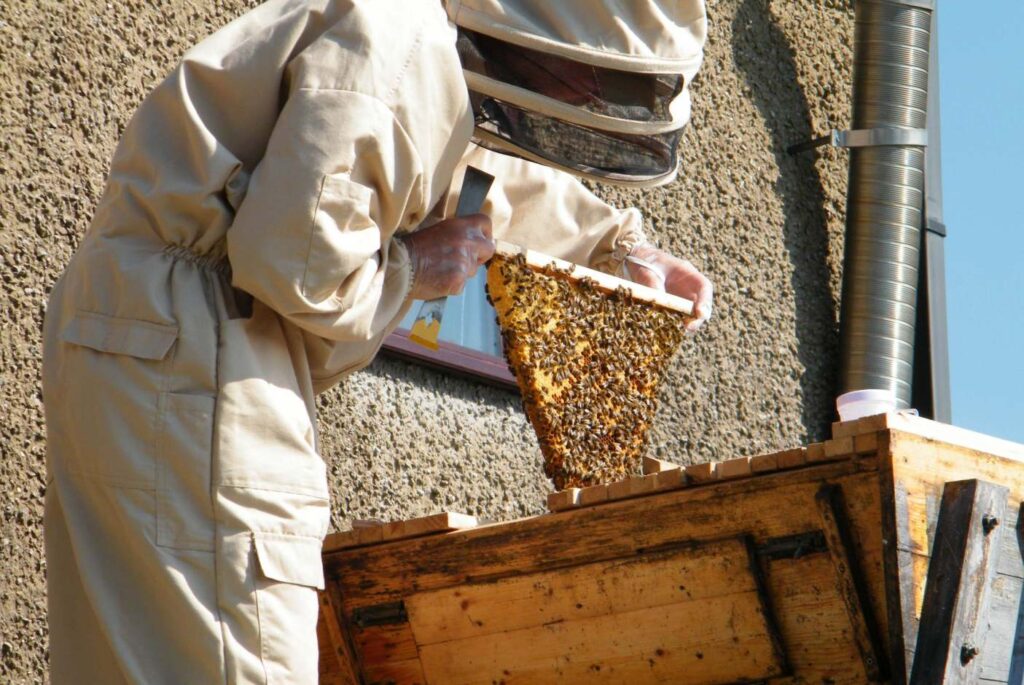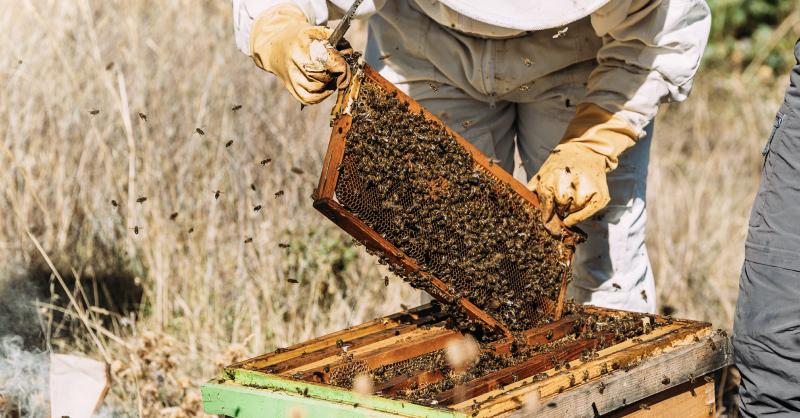
Have you ever wondered about the ethical implications of beekeeping? This article explores the question of whether beekeeping can be considered ethical. With a focus on the important role of bees in pollination and honey production, we examine the potential impact of keeping bees in captivity. From the use of smoke to manipulate bee behavior and the extraction of honey from their hives to the possible spread of diseases, this article examines both sides of the ethical argument surrounding beekeeping.

Overview
Beekeeping, also known as apiculture, is the practice of caring for honeybees and their colonies. It has been an integral part of human civilization for centuries and plays a significant role in maintaining biodiversity and ecosystem health. While beekeeping offers various benefits such as promoting pollination, supporting honey production, and providing economic advantages, it also raises concerns about the exploitation of bees, the use of artificial substances, and the potential harm to native bee populations. This article aims to provide a comprehensive analysis of the ethics of beekeeping, exploring both the favorable and unfavorable aspects, as well as highlighting the importance of ethical considerations, regulations, and alternatives in this industry.
Introduction to Beekeeping
Beekeeping is a fascinating and intricate craft that involves the management and care of honeybee colonies. It entails providing suitable habitats for bees, tending to their needs, and reaping the rewards of their hard work, such as honey and beeswax. Beekeepers often begin by acquiring or attracting a bee colony, establishing the hive, and ensuring the well-being and productivity of the bees. This ancient practice has evolved over centuries and continues to be embraced by individuals and communities worldwide.
Importance of Bees in Ecosystems
Bees play a vital role in maintaining the delicate balance of ecosystems. As pollinators, they perform the crucial task of transferring pollen from one flower to another, enabling plants to reproduce and bear fruit. This process not only ensures the continuity of various plant species but also contributes to the biodiversity and stability of ecosystems. Without bees, many plants would struggle to reproduce, leading to a decline in food sources for animals and potential disruptions to entire ecosystems. Beekeeping, therefore, plays a crucial role in supporting pollination and preserving the health and diversity of our natural habitats.
Historical Significance of Beekeeping
Beekeeping has a rich historical significance, with evidence of its existence dating back thousands of years. Ancient civilizations such as the Egyptians, Greeks, and Romans revered bees and honey, recognizing their value as a food source, medicinal ingredient, and symbol of prosperity. In ancient Egypt, beekeeping was seen as a sacred art, and honey was used in religious rituals and offerings. Throughout history, beekeeping techniques have been passed down through generations, contributing to the development of diverse beekeeping traditions and practices around the world.
Arguments in Favor of Beekeeping
Promotes Pollination and Biodiversity
One of the key benefits of beekeeping is its positive impact on pollination and biodiversity. Bees are highly effective pollinators, and their activities significantly contribute to the reproduction of many plants. By keeping bees and providing them with suitable habitats, beekeepers help ensure the pollination of local flora, including wildflowers, fruit trees, and agricultural crops. This promotes biodiversity and safeguards the availability of diverse food sources for both humans and wildlife.
Provides Economic Benefits
Beekeeping’s economic benefits contribute to its favorability. Honey production, beeswax, and other hive products can generate income for beekeepers, supporting their livelihoods and local economies. Furthermore, beekeeping can create job opportunities in the industry, such as hive maintenance, honey processing, and hive product distribution. The sale of honey and other hive products also fosters local entrepreneurship and stimulates economic growth, particularly in rural areas where beekeeping is prevalent.
Supports Honey Production
Honey, renowned for its unique flavors and health-enhancing properties, is a prized product of beekeeping. Beekeepers carefully harvest honey from their hives, ensuring that the bees have ample reserves for their own sustenance. The production of honey offers consumers a natural and sustainable sweetener alternative while also providing a source of revenue and pride for beekeepers. Many beekeepers adopt sustainable practices, such as organic beekeeping methods, to ensure the quality and integrity of their honey production.
Arguments Against Beekeeping
Exploitation of Bees
Critics of beekeeping argue that it exploits bees by subjecting them to human control and manipulation for economic gain. They contend that beekeepers prioritize honey production over the well-being of the bees, occasionally employing intrusive practices that may stress or harm the colonies. Critics argue that this exploitation clashes with the natural behavior and instincts of bees, potentially jeopardizing their overall health and happiness. Reducing beekeeping to a mere means of profit may undermine the ethical foundation of the practice and warrant careful consideration of alternative approaches.
Use of Artificial Substances
Another argument against beekeeping revolves around the use of artificial substances, such as pesticides, antibiotics, and chemicals for hive management. These substances are sometimes employed to control pests and diseases, ensure hive hygiene, and boost honey production. Critics argue that the widespread use of such substances may have long-term detrimental effects on both individual bees and overall hive health. They assert that relying on these artificial interventions could disrupt the delicate ecological balance and undermine the natural resilience and immunity of bee colonies.
Harmful Effects on Native Bee Populations
Critics also express concerns about the potential adverse effects of beekeeping on native bee populations. Honeybees, although valuable pollinators, are not the only species of bees. There are numerous native bee species that play vital roles in local ecosystems. By introducing honeybee colonies into an area, it is feared that they could outcompete or transmit diseases to native bees, endangering their populations. This concern highlights the need for careful management practices and considerations for local biodiversity when engaging in beekeeping activities.
Ethical Considerations in Beekeeping Practices
Treatment of Bees
Maintaining ethical practices in beekeeping involves prioritizing the well-being, health, and happiness of bees. This includes providing suitable and spacious hives, ensuring access to adequate food sources, and minimizing disturbances to the bees’ natural behavior as much as possible. Beekeepers committed to ethical practices opt for non-intrusive approaches, such as holistic hive management, which prioritize the bees’ intrinsic needs and preserve their natural rhythms.
Harvesting Honey
Ethical beekeepers approach honey harvesting with mindfulness and care for the bees. They strive to strike a balance between meeting their own needs and allowing the bees to retain sufficient honey for their sustenance during times of scarcity. Employing methods such as selective harvesting or leaving surplus honey frames for the bees to consume promotes a mutually beneficial relationship between humans and bees.
Providing Suitable Habitats
Creating suitable habitats for bees is an essential ethical consideration in beekeeping. This involves selecting hive locations that offer a diverse range of nectar and pollen sources and providing opportunities for bees to forage and thrive in their natural environment. Ethical beekeepers aim to create bee-friendly spaces that enable the bees to lead healthy lives, express their natural behaviors, and contribute to the surrounding ecosystem.
Minimizing Use of Chemicals
Ethical beekeepers emphasize the importance of minimizing the use of chemicals in hive management. They opt for natural pest control methods, such as integrated pest management, that reduce reliance on synthetic pesticides. Additionally, they prioritize disease prevention through proper hive hygiene, environmental management, and the selection of disease-resistant bee stock. Minimizing the use of chemicals minimizes potential harm to bees, supports the preservation of their natural resiliency, and safeguards the integrity of hive products.

Concerns About Commercial Beekeeping
Mass Production and Stress on Bees
Commercial beekeeping, primarily driven by large-scale honey production, has raised concerns about the well-being and stress levels of bees. In order to maximize productivity, commercial operations often maintain numerous hives in concentrated areas, creating intense competition for resources among the bees. This overcrowding, coupled with the transportation and relocation of hives for pollination services, can lead to increased stress levels and contribute to the susceptibility of diseases and pests. Minimizing stress and ensuring the welfare of bees should be a key focus area for commercial beekeeping practices.
Queen Breeding and Genetic Manipulation
Another concern associated with commercial beekeeping is the practice of queen breeding and genetic manipulation. Commercial operations often prioritize queens that exhibit desirable traits, such as high honey production or docility, and selectively breed colonies to propagate these characteristics. While this might enhance productivity, it may also result in a loss of genetic diversity and compromise the natural adaptations and resilience of honeybees. Maintaining a balance between selecting desirable traits and preserving genetic diversity is crucial to maintaining the long-term health and sustainability of honeybee populations.
Migratory Beekeeping and Transportation Stress
Migratory beekeeping, where hives are transported over long distances to provide pollination services to different agricultural regions, poses additional challenges. The constant movement and exposure to unfamiliar environments can stress bees and have negative impacts on their immune systems. Furthermore, the potential for the transmission of pests and diseases between regions increases when hives are transported. Minimizing transportation stress and optimizing hive management practices during migration are essential to ensure the well-being of bees involved in migratory beekeeping.
Regulations and Standards in Beekeeping
Certification Programs
Certification programs for beekeepers have emerged to promote ethical practices, sustainable beekeeping, and consumer awareness. These programs provide beekeepers with guidelines and standards to adhere to, ranging from hive management practices to honey processing and labeling requirements. Certifications such as “Organic Beekeeping” or “Pollinator Friendly” provide assurance to consumers that the beekeeping operation has met certain criteria and supports ethical and sustainable practices.
Best Practices Guidelines
In addition to certification programs, various organizations and agencies have developed best practices guidelines for beekeepers. These guidelines encompass a wide range of topics, including hive management, pest and disease control, and the handling of bees and hive products. By adhering to these guidelines, beekeepers can ensure they are providing the best possible care for their bees while minimizing adverse effects on the environment and native bee populations.
Government Regulations
Governmental bodies also play a crucial role in beekeeping regulation. They establish legal frameworks, licensing requirements, and inspection procedures to ensure the well-being of bees, the integrity of hive products, and the protection of native bee populations. These regulations help enforce ethical practices, prevent the spread of diseases and pests, and ensure the sustainability of the beekeeping industry. Government involvement in regulating beekeeping reflects the recognition of the importance of ethical considerations in this field.

Alternatives to Conventional Beekeeping
Wild Bee Conservation
To complement, and in some cases replace, the practice of beekeeping, the conservation of wild bee populations is becoming increasingly important. Protecting and preserving native bee habitats, such as wildflower meadows and natural nesting sites, is crucial to maintaining biodiversity and sustaining pollination services. Conservation efforts can involve creating protected areas, establishing pollinator-friendly landscapes, and promoting public awareness and engagement in wild bee preservation.
Native Pollinator Habitat Creation
Creating native pollinator habitats is another alternative approach to conventional beekeeping. This involves designing and planting gardens, parks, or agricultural landscapes with an abundance of native flowering plants that provide food and shelter for a diverse range of pollinators. By focusing on the preservation and restoration of natural habitats, this approach encourages the presence and well-being of native bees and other pollinators, supporting overall ecosystem health.
Other Forms of Pollination
While honeybees receive much of the attention in the world of pollination, other insects, birds, and even bats also contribute to this vital ecological function. Exploring alternative pollinators could offer diverse approaches to support pollination without solely relying on beekeeping. Encouraging the presence and conservation of various pollinator species can supplement the efforts of honeybees and strengthen ecosystem resilience and sustainability.
Beekeeping and Honey Ethics
Fair Trade Honey
In response to concerns about ethical practices in the honey industry, fair trade honey has gained traction as an alternative option. Fair trade certification ensures that beekeepers receive fair prices for their honey, adhere to social and environmental standards, and invest in community development projects. By purchasing fair trade honey, consumers can support beekeepers who prioritize ethical practices and contribute to the sustainability of local communities and ecosystems.
Organic Honey
Organic honey production follows strict standards that prohibit the use of synthetic chemicals and pesticides in hive management. This ensures the honey is produced in an environmentally friendly manner and free from potentially harmful residues. Choosing organic honey aligns with conscious consumer choices and supports beekeepers who prioritize ethical and sustainable approaches to honey production.
Sustainable Honey Production
Sustainable honey production encompasses a holistic approach to beekeeping, prioritizing the long-term health and well-being of bees, as well as the preservation of ecosystems. Sustainable beekeepers employ methods that minimize environmental impact, promote biodiversity, and maintain the natural resilience of bees. By supporting sustainable honey production, consumers can contribute to the conservation of bees, ecosystems, and the wider planet.

The Role of Education and Awareness
Informing Beekeepers About Ethical Practices
Education plays a crucial role in promoting ethical practices in beekeeping. Providing aspiring and existing beekeepers with comprehensive training on hive management, native bee conservation, and sustainable practices equips them with the knowledge and skills necessary to make informed and ethical decisions. Educational resources, workshops, and mentorship programs should emphasize the importance of considering the well-being and natural needs of bees throughout all beekeeping activities.
Importance of Consumer Awareness
Consumer awareness plays a vital role in shaping the practices and standards of the beekeeping industry. By actively seeking out ethically produced honey and hive products, consumers can make a positive impact and drive demand for sustainable and responsible beekeeping practices. Increased awareness about the potential environmental and ethical implications of commercial beekeeping can encourage consumers to support local and ethical beekeepers, ensuring that their purchasing decisions align with their values.
Promoting Sustainable Beekeeping Practices
Creating a widespread culture of sustainable beekeeping requires collective efforts from government agencies, beekeeping associations, environmental organizations, and consumers. Collaborative initiatives promoting sustainable practices, providing support and resources to beekeepers, and raising awareness about the importance of ethical considerations can drive positive change. By working together, we can foster sustainable beekeeping practices that prioritize the well-being of bees, the preservation of ecosystems, and the satisfaction of ethical consumer demands.
Conclusion
In conclusion, the ethics of beekeeping encompasses a range of considerations, including the treatment of bees, the impact on native bee populations, the use of chemicals, and the sustainability of honey production. While beekeeping offers numerous benefits, it is vital to maintain ethical practices that prioritize the well-being of bees, preserve biodiversity, and ensure the long-term health of ecosystems. Regulatory frameworks, certification programs, and educational initiatives play essential roles in promoting ethical beekeeping practices. By supporting sustainable beekeeping and making informed consumer choices, we can foster harmony between humans and bees, protecting these invaluable pollinators and the ecosystems they sustain.
